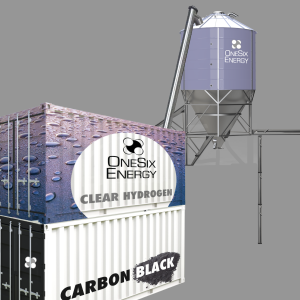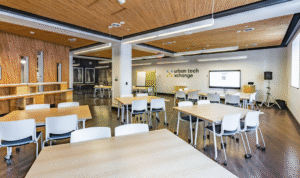
- Kim Kisner
- Events
- 05/23/2023
SBN Detroit’s May 18th Virtual Event Begins to Unpack the IRA and the Opportunities it Presents

The Inflation Reduction Act of 2022 includes $500 billion in new spending and tax breaks targeted toward climate change, clean energy, training, and workforce development, the development of clean infrastructure, and more.
It puts the U.S. on a path to 40% emissions reduction by 2030 with these desired impacts:
- Lower energy costs
- Increased energy security
- Investments in decarbonizing all sectors
- Focused investments in disadvantaged communities
- Support for resilient rural communities
Additionally, the legislation act offers businesses and entrepreneurs unprecedented opportunities but identifying these opportunities and navigating how to capitalize on them can be daunting.
To help small- and medium-sized businesses understand the act, SBN Detroit held a virtual event on May 18 featuring Joel Howrani Heeres, director, Public Sector Consultants; Jerry Davis, professor, Ross School of Business; Dan Radomski, executive director, Centrepolis Accelerator at Lawrence Tech University, and Kimberly Hill Knott, president and CEO, Future Insight Consulting.
Each speaker presented according to their areas of expertise, followed by a Q & A. We’ve shared some of the speakers’ points below. You can view the full event here.
- A significant portion of IRA rebates goes to homeowners, creating an opportunity for contractors to provide energy audits, electrification upgrades, and more. The funds allow for roughly 5,000 houses to take advantage of rebates. – Howrani
- There are five components involved in creating an enterprise – capital, labor, organization, supply, and distribution. The IRA creates opportunities within each of these components. – Davis
- When it comes to cleantech funding, it’s important to understand what stage of development you are in and how that applies to different funding opportunities. Generally, funding comes in when technologies are mature and ready for deployment. But there are different opportunities within the different stages. – Radomski
- As we transition to the Infrastructure Investment and Jobs Act (IIJA) there will be more investments in infrastructure, and the money will flow through state agencies and departments. – Radomski
- The key to being e successful with IRA funding is collaboration. Addressing climate change is multifaceted. For example, residential electrification dollars are coming. but many houses are not necessarily ready to replace fossil fuel sources with electricity. So, there is an opportunity to partner with community action agencies that manage funds for home repair to get homeowners ready. For example, the community action agency essentially does intake and prep, and a private contractor does the electrification work to use the rebates. – Howrani
- There are new opportunities up and down the supply chain from technicians to engineers to manufacturing. This is going to take an effort in workforce development by universities, community colleges, and manufacturers themselves. We need education in all of these areas which will lead to jobs and wealth creation. – Radomski
- My students surveyed local small businesses regarding their priorities around green energy. The overwhelming response was reliability. For these businesses, extended power outages could be catastrophic. This presents an opportunity – how do we solve this? – Davis
- Understanding that the IRA is not easily interpreted, I had my students translate parts of it into easy-to-understand How to Guides and also sample business models which can be found at Greenbiztransition.com
View the full presentation and Q&A here.
Be sure to subscribe to our newsletter for regular updates on sustainable business practices in and around Detroit.
Kim Kisner
- All
- Business
- Community
- Education
- Events

Eastern Market Partnership, in collaboration with the City of Detroit’s Office of Sustainability Urban Agriculture Division, has announced $240,000 in grant funding to support Detroit-based farmers and farmer collectives. The grants will advance food access, climate education, sustainable land use, and economic opportunity, with priority given to Black- and Indigenous-led farms, youth-led initiatives, and projects rooted in historically disinvested neighborhoods. The recipients – ranging from cooperatives and community...

Citizen Robotics is a Detroit-based nonprofit that advances the use of robotics and digital manufacturing in residential construction, focusing on improving productivity, sustainability, and long-term affordability. Best known for its early work in 3D-printed housing, it explores how alternative construction methods and new financial models can reduce material waste, lower lifetime operating costs, and enhance the resilience of homes. SBN Detroit interviewed Tom Woodman, founder and president of...

Detroit-based OneSix Energy is a clean-energy technology company focused on advancing a lower-carbon approach to hydrogen production. Headquartered at Newlab in Detroit, the startup is developing a proprietary methane pyrolysis system designed to produce hydrogen without carbon dioxide emissions, while also generating solid carbon as a co-product. SBN Detroit interviewed with cofounder Stefan Sysko about the company’s origins, its approach to hydrogen production, and why Detroit is positioned...







